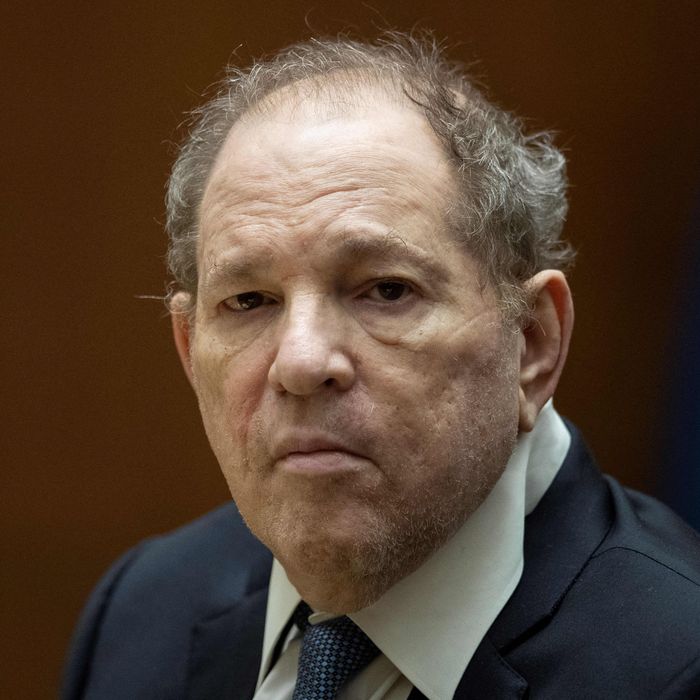
Harvey Weinstein long wielded his power to be treated better by the legal system than a typical person accused of violent crimes would be. On Thursday, New York’s highest court said that, nonetheless, he didn’t deserve to be treated worse. They overturned his conviction for assaulting two women, for which he had been sentenced to 23 years in prison, and ordered a new trial. (Weinstein will remain in prison for convictions in California.)
The narrow majority agreed with Weinstein that prosecutors shouldn’t have been allowed to bring into criminal court the cumulative testimonies of multiple women — the very things that helped Me Too grow from a hashtag to a movement — because their cases weren’t being directly charged. (He has been accused of sexual abuse or harassment by nearly 100 women.) The majority opinion and two dissents laid bare a simmering, unresolved conflict of Me Too and its aftermath: Does the gendered, intimate nature of sexual violence, weighted with power imbalances and complex questions of consent, require a systemic overhaul of the legal rules, or is that a slippery slope to the kinds of due-process violations that inevitably come down hardest on people far less privileged than Weinstein?
“With today’s decision, this Court continues to thwart the steady gains survivors of sexual violence have fought for in our criminal justice system,” wrote Judge Madeline Singas in her dissent. The majority responded, “On the contrary, consistent with our judicial role, our analysis is grounded on bedrock principles of evidence and the defendant’s constitutional right to the presumption of innocence and a fair trial.”
That majority opinion couldn’t be dismissed as a bunch of clueless white guys protecting the powerful. Its author, Judge Jenny Rivera, worked as a public defender and civil-rights advocate. Singas, meanwhile, was a prosecutor whose official biography describes her as having focused on domestic and sexual abuse. She went so far as to accuse the majority of displaying “fundamental misunderstandings of sexual violence perpetrated by men known to, and with significant power over, the women they victimize.” Rivera responded directly to Singas that adopting her desired standard “would only amplify the risk that biased jurors would justify a vote to convict defendants of color on such uncharged conduct in cases where the evidence supporting the charged conduct is weak — an all too real phenomenon.”
It was a high-stakes revival of the perennial question of whether Me Too had gone too far. “For all those quick to jump to conclusions and unhelpful assessments about the power and reach of the survivor justice movement,” retorted Fatima Goss Graves, president of the National Women’s Law Center and a co-founder of the Time’s Up Legal Defense Fund, in a statement, “today is a reminder that survivors often still live in the margins, with fine print and loopholes getting in the way of what looks like justice and healing for them.”
Under a 1901 precedent known as the Molineux rule, prosecutors can’t bring evidence of “prior bad acts” only to prove that someone has a propensity to commit a crime. But there are exceptions. In the Weinstein case, the trial-court judge allowed the testimony of three such witnesses, including actress Annabella Sciorra, if they could illuminate Weinstein’s intent and whether he could have understood that the victims he was charged with assaulting didn’t consent. Prosecutors had argued that they would add important context about the entertainment industry and Weinstein’s role in it. The witnesses also sought to counter myths about how a sexual-assault victim would behave — for example, to help the jury explain why someone might go on to have a consensual relationship with a man who she said had previously raped her. The majority said not only was the additional testimony not allowed, it wasn’t needed to convict because “there is no equivocality regarding consent when a person says ‘no’ to a sexual encounter, tries to leave, and attempts to physically resist their attacker before succumbing to the attacker’s brute physical force.”
From the start, despite the numerous accounts of grotesque violence on the record, actually putting Weinstein in prison wasn’t a slam dunk, at least in New York. When the case did go to trial at the beginning of 2020, there were whispers that Weinstein would be acquitted, that prosecutors were going out on too much of a limb. So much rested on the two women whose cases were being charged. Too many women’s cases had passed the statute of limitations, or they described events that had taken place outside New York’s jurisdiction, or there wasn’t enough evidence to be confident of a win, or they just didn’t want to cooperate. Weinstein’s instantly notorious attorney, Donna Rotunno, tried to make the trial a referendum on the upending of gender norms. “The pendulum is swinging so far in the overly sensitive direction that men can’t really be men, and women can’t really be women,” she told Vanity Fair in the lead-up to the trial.
During questioning, Weinstein’s attorneys did their best to present the women as having consented to a transactional relationship with their client. Singas compiled some of the greatest hits: “You are allowing all this to happen … Manipulating him to make him think that you wanted to see him by sending him e-mails, by going to meet with him and by engaging in consensual sexual acts?” and “You decided to go out with a married man, correct? … You decided to have sexual relations with [him]?”
Ultimately, there is nothing immutable about either the law or the precedents the judges interpreted to come to this conclusion in New York. California, where Weinstein was tried with the testimony of four additional accusers, and about a dozen other states “have decided that the traditional prohibitions don’t make sense when a jury must ascertain whether a sex crime took place. In these cases, the jury needs to know more about the defendant — particularly what other victims would say about him under oath,” wrote former prosecutors Tali Farhadian Weinstein and Jane Manning in a 2022 op-ed advocating for New York to do the same via legislation. What makes sex crimes different, they argued, is that “often, you don’t have witnesses to a crime committed behind closed doors, and sometimes in the context of an intimate relationship. But what you may have are other victims, who can echo and corroborate a victim’s account of violence.” (As to whether this would mean all defendants would be railroaded, they point out that juries still managed to acquit Weinstein on some of the accounts.)
A cascade of survivors’ accounts, doggedly pursued by investigative journalists, was finally enough to bring Weinstein’s abuses to light along with those of countless others. That was enough for journalism. Today, it wasn’t enough for the law.






























